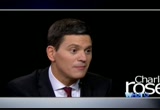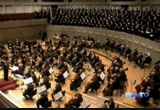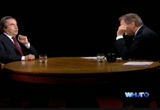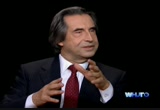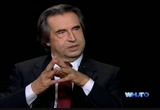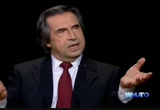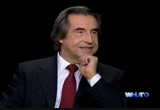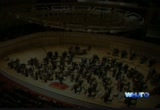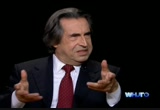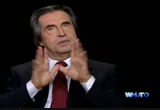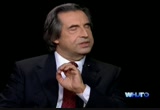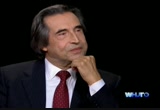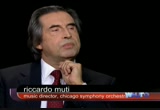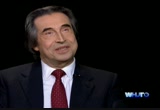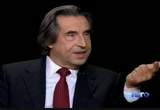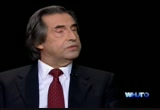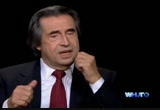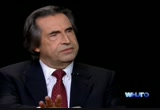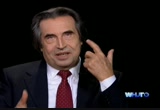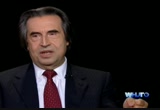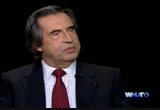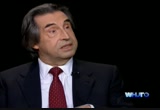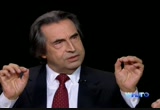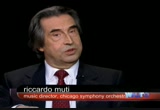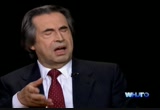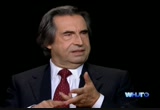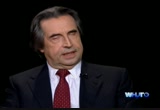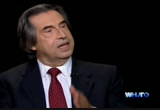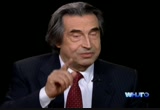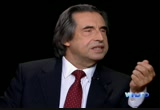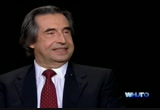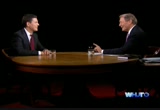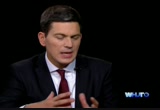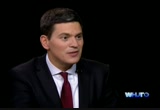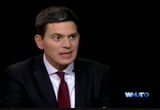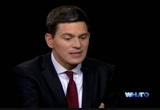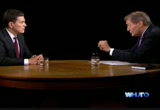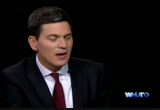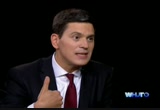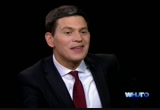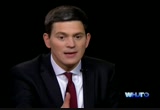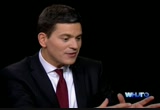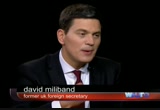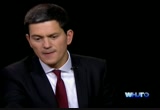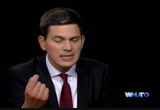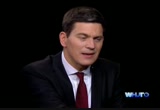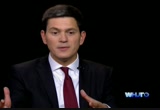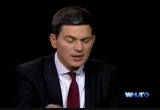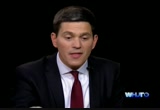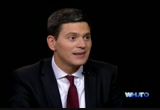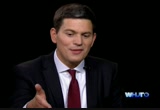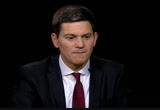tv Charlie Rose WHUT October 3, 2012 6:00am-7:00am EDT
6:00 am
welcome too the program, we begin this evening with riccardo muti, the music director of the chicago symphony orchestra. >> it is fantastic musicians and know exactly what you are doing. they have, because of wonderful musicians their own ideas about interpretation, so the conductor has to bring the musicians to his ideas, not necessarily convincing them that it is the only possible idea, but the only good idea, but it is one possible idea, so convincing that they, even with different ideas can follow you. >> rose: we conclude with david miliband, the former secretary otates kin.>> i think, the vision, we e
6:01 am
running out of road. >> rose: right. >> and i think to have snood the way of that would have put ourselves in an impossible position. i don't buy the argument that the arab spring has become an arab winter, i just don't buy that. >> rose: right. >> that is not to say that there aren't very important differences between the different countries which i think sometimes is lost in the discussion that lumped the whole of middle east and north africa together. there are really serious issues because obviously the muslim brotherhood are the best organized political force in many of these countries, the only organized political force. >> rose: muti and miliband when we continue. funding for charlie rose was provided by the following.
6:02 am
6:03 am
great conductors and led some of the best orchestras, including the vienna philharmonic, he is currently music director o director of the chicago symphony orchestra, critics and audiences alike have been dazed and charmed which the intensity, the technique, the emotion that he and his musicians bring. here is a look at a performance of verdi requiem. ♪ .. ♪ ♪
6:04 am
>> rose: muti and the chicago symphony orchestra in new york, to open the season at carnegie hall on october 3rd, they are performing orff's carmina burana, i am happy to have mastery i are back at this table, when you are conducting what are you thinking about? what is going through your head are you hearing the music instantaneously in your head that you know the score or what? >> this is a difficult, it is difficult to answer this question. in any case the conductor starts the performance one frac shun of a second before and ends one second of a frac shun before. >> rose: yes. >> so it is almost a little bit ahead. hhe has to prepare for the musicians the mechanical part, the entrances, the queue, this and that, but you have to, in quotes, to inspire them .. that is a very difficult work, you
6:05 am
know, to inspire. at least you are to convey your ideas and to do that properly, you participate. so don't have time to think about other things. that would be very, very dangerous. even when you conduct a symphonic poem, like the pines of rome, many people think the conductor during the performance sees in his mind the pines of different sections of rome, but mieferk is music is not a description, it evoke. >> evoke. >> the situations, not a description. >> rose: when you -- when you think about a piece and you are inspiring, are you inspiring with your vision or are you inspiring with the composer's vision? >> >> we try to inspire through the
6:06 am
composer vision, but we know that brahms when he conducted in vienna his symphonies and repeated the performance in three, four different days, he changed sometime dramatically his vision, so which one was the right one? >> rose: yes. >> because we try through the notes to understand the meaning of the composition and the ideas of the composer, but what is behind the notes is the entire universe, and that you cannot control. >> rose: do you exchange your own vision, change your own vision of the piece as well, the conductor has different visions -- i mean the composer, depending on the day also might the conductor. is it differently because of how he -- what is happening in his life and how he seize some
6:07 am
incredible piece of art? >> >> to change dramatically the vision is -- would be like you don't have any vision. >> rose: yes. >> but we are different in any moment, and every moment, already we are different -- >> rose: exactly. that's my point, exactly. and the brain is different. the brain changes. >> so you have in front of you 100 musicians and they change all the time because life goes through, and if you do, for example, four times the beginning of the beethoven seventh symphony, this chord, even if you do one time after the other will change slightly, because everybody will be different, even if everybody will try to follow with the intensity your intentions, your intentions will be different,
6:08 am
the result will be different, only on a cd it is the same. >> rose: and that's why it is exciting. >> it is unpredictable. >> rose: unpredictable, exactly. >> because i remember when i was a student, my teacher that was the assistant of toscini when i was going to conduct, going to the platform, he always said to me, you are very well prepared, but remember, we are under the sky. anything can happen. >> rose: tell me why carmina burana to open carnegie hall. >> we had played carmina burana in chicago, and we were asked to play this piece for the opening of, the coming season at carnegie hall. >> were you happy about that request? >> i love this piece. i respect this piece and i have great respect for karl orff that i met personally in 1980 when i
6:09 am
conducted this piece in berlin with the berlin philharmonic and karl orff was even sick at that time, because he was old and ill, he came to the berlin and he wrote to me after the performance, in memory of this performance that i consider my second premiere. i think that this piece is generally seen also through commercials, the beginning has been abused, used, used in commercials, as a sort of funny piece or piece of -- full of joy, like an entertainment. >> rose: yes. >> but it is a very dramatic piece because it is a reflects the dark era, medieval era and being italian, you know, i am very familiar with this monastery or universities that
6:10 am
are very old and carry this dark atmosphere, so the piece seems to exaggerate speaking about drinking, love, to make love, to drink, it is not for just for the pleasure of doing these things, but only through these things you can forget life, that is not something very nice. ♪ ♪ ♪ >> rose: was he controversial because of some of his political
6:11 am
sympathies? >> this has been said, and some people still say, i think that first this was not very popular in the beginning. also because, you know, in a period where the people there felt that about the superior race, this and that, and that life is not at all happy, it is not wonderful and we are miserable, you know, there is nothing positive in this piece. then they changed mind and thought it was a piece that in a way went against the idea that was a crazy idea, but still their idea. personally, i remember a person of great culture, of great finesse, and extremely kind and gentle. >> rose: when you look at the journey of your life from the
6:12 am
violin, piano, composing, conducting, is that the perfect sort of flow for someone who wants to lead a great orchestra? >> first, i didn't want to be a musician, so the first quality, i mean, the first -- if you don't want something, you get it. and -- but i studied very serious but fortunately -- >> rose: what did you want to be? >> first, my father was a medical doctor. we are five brothers and he wanted one to be a doctor, one to be an architect, one -- my profession was supposed to be to become a lawyer, which would have been a disaster, total disaster. so for reasons that are too long to explain, i became a musician, but my father never gave me the permission to abandon the regular status, the classical
6:13 am
studies, the university -- it is very important, because i am -- i still can translate well in latin, and because i studied latin for eight years and for five years greek, so this culture -- this classic culture has helped me. also to take some time certain classical distance from the crazy world of music and i still consider myself an outsider of the world of music. i am a musician, but a musician the moment i rehearse with my musicians i do the concert and then i don't have anything to do with the world of music and musicians. >> rose: okay. so suppose it is way too early, we were composing the first paragraph of your obituary. >> my obituary? >> rose: your obituary. what would you want us to say? would music be in the first
6:14 am
sentence or two? >> no. i will say exactly what i said to the many orchestras, many singers. here, approximately, here lies riccardo muti, a crazy man that spent all of his life trying to find a correct waiver or quarter note. it is a disaster. but music has been good to you. >> very. very good. , you know, music is the only art -- and i know this by experience, that can bring people together and make people to communicate even if they don't speak the same language, they have different religions. >> rose: so when you left la scala, why did you leave?
6:15 am
>> as i said, i was in la is a la for 19 years, scala for 19 years, even longer than -- >> and my relationship with the orchestra and the chorus has always been for 19 years perfect. then when i had a fight with the administration, let's say, because i don't want to indicate this or that person, and everything became political, and in italy, when something becomes political, and the controversial, politically speaking, then the only thing that you can do is to leave. but 19 years are a part of my best years in my musical career, so i said, you know,, to explain exactly details of what happened is impossible, and the newspapers generally made a mess of the entire story, because they didn't know exactly the
6:16 am
details. they thought that the orchestra was against me, but this is not true. >> rose: not true. >> absolutely not true. i never had a fight with an orchestra in my life. but there were reasons outside of the artistic field that created a situation and we couldn't communicate anymore. we had completely different ideas. >> rose: there was no one that could have made a difference? >> no. because we mentioned before this dictators, you know, in a very, very contrite way but mussolini one time said, speaking about italy, said one phrase that is memorable. he said so many stupid things but one thing was interesting, he said to control it, to govern the italians is not difficult. it is impossible.
6:17 am
so in that situation like that, it would have been impossible to control anything. so i left. >> rose: so you left. >> and then i became a free bird. >> rose: and how did that feel? >> fantastic. it was fantastic. because i had been music director all my life since 1968, in florence. london philharmonic, philadelphia orchestra after armandi,bascala, so after so many years of hard work, not only artistically and musically, but all of the other things that music -- a good and honest music director is to take care of, i worked so hard, that certainly i felt -- i feel light, i have to
6:18 am
do only music when i want, where i want, and how i want, i was, i felt like a bird, a as i said before, ligero, and that's when the philadelphia philharmonic asked me to be the music director. i did several concerts, many concerts with th the philharmonc and beautiful concerts, i admire those musicians. i think they are very good, and they have, i have wonderful memories, so when i was asked to become music director i was hesitant. i didn't know, yes, no, yes, no, yes. but i thought it was the right moment to be engaged again, not because i had a divorce before, just, you know, i felt so good to be free. >> rose: so the timing wasn't right? >> si, si. the timing wasn't right. and then i continued to be free
6:19 am
around the world, especially connected with the vienna philharmonic, the orchestra that has been connected with me all of my life, because i made my debut in vienna with the vienna philharmonic in 1971 and since then, i have conducted them every year with tours, concerts, 200 concerts in salzburg. so an enormous quantity, and so i was always -- i could enjoy playing with them and then the president of the chicago symphony started to appear here and there in berlin, in vienna, in paris. and i saw this nice hey difficult, president of the chicago symphony, and so she
6:20 am
started to -- her presence, one, two, three, four, times and made clear to me that she was interested to invite me to conduct the chicago symphony. so she invited me, in fact, and i went back to chicago. i was not sure, because, you know, after you have conducted so many orchestras all of your life, especially in the last years, i had abused my presence with four or five orchestras, the orchestras, that are very dear to my heart, so to go back to an orchestra that i had not conducted for 30 years, i was very doubtful. why go there, to find new musicians and even if you are a famous conductor and they are famous orchestra, still, when these two entities meet, the first few minutes the musicians think, okay now we will judge him, he is very popular with vienna, berlin, et cetera but now it is our turn to say how
6:21 am
good he is and the conductor is thinking the same thing, so you are not making music, you are making a sort of -- >> rose: you are making assessments. >> and, but anyway, she convinced me and i went to chicago, and when a conduct for meets an orchestra, to say something, you can't just say good morning, beethoven fifth. there is a sort of -- and i didn't know what to say. i thought maybe say this, you know, but the usual phrase, i'm so happy to be here with you. they know exactly what you are going to say this and this is nothing new. but the last moment, something came to my mind that was really true. i said, i conducted you 50, more than 30 years ago, and at that time, i was a young man and a young conductor, now after more than 30 years, i don't -- i hope that you will not collect the
6:22 am
ruins of that man and that conductor. so like pompey. and they reacted in a very direct and happy way and we started. >> rose: it was a marriage made in heaven. >> and then i started a precocious the symphony number 3, that is a very difficult and dramatic symphony and from the first moment, i felt that i had a ferrari in my hand, this is a very difficult and demanding symphony, everything i did was there, immediately with the position and as i said, ferrari is not going to pay me for mentioning that. we can say another car. >> rose: but you always drive one. >> si. and then we made a tour after this concert, that was very successful and after the tour, every concert, and a tour with
6:23 am
an orchestra can be fantastic marriage between conductor and orchestra and musician, and it can be a disaster, because every day you are in a different city and the orchestra becomes tired, you are tired and to find the inspiration, to inspire them and then it is hot, the food on the plane but not good, there are so many reasons where the concert can be a disaster, and every concert was one better than the other, and after the tour, i felt also that they are wonderful human beings, not only great musicians, and after the tour, i received more than 60 individual letters from the musicians, nice letters saying how much they enjoyed making music with me. so it was something that really touched me. so when debra appeared again,
6:24 am
like minerva, and she invited me there, again, insisting, insisting, i thought, they are asking me to go there, so maybe really they want me there. i don't know. i am not young, but i am not that old to, and so why not to -- this will be certainly will be the last engagement with an orchestra, not because there is no time, conductors sometimes live too long. >> rose: yes. >> you know,, and i said, a conductor from the door of the stage to the podium needs more than 30 seconds, it is time to retire. >> rose: it is a physical thing. >> si, absolutely. >> rose: but you had no great unfulfilled dream in music?
6:25 am
>> si. >> rose: think of the stops you made and where you are and you say this is the last stop as music director. >> si. >> rose: of a great symphony. >> yes. si, the last one, and also because i think it is the best, and so this is -- >> rose: and that the best orchestra in the world. >> >> rose: best orchestra in the world today is the one you conduct now? >> you know, to say the best is always very difficult, because you say -- is better than -- or it is better than raphael, but we can say certainly that it is one of the two or three greatest orchestras in the world. >> rose: who are the other two? >> certainly i would put together with chicago, vienna and berlin. >> rose: and berlin. where would you put the new york philharmonic. >> as the great orchestra, but after i say this, then it depends on who is the driver.
6:26 am
>> rose: yes. >> because even a great, great orchestra can sound not good in the hands of -- because, you know, better is the orchestra, more difficult is to strife. >> rose: yes. >> it is not contrary. >> rose: the better the orchestra the more difficult it is for you? >> for the conductor, because you have fantastic musician they know exactly what you are doing. they have, because they are wonderful musicians their own ideas about the interpretation, so the conductor has to bring the musicians to his ideas. not necessarily convincing them that this is the only possible idea, but the only good idea, but this is one possible idea, so convincing that they, even with the different ideas, can follow you, and you can do that, not in a buying, dictatorial way, but not also begging, you cannot say to a musician, excuse
6:27 am
me, can you please give me this even if it is a story of carlos cliveer, great conductor that was a friend, great friend of mine, we were very, very good friend. and during a rehearsal, he was asking to the clarinet, german orchestra, for a piasimo and the player answered almost in a rude way, he said i am playing piano, i am playing piano, sometimes you have this kind of answer. and cliver answered, said, you know, conductors are not dictators, we are like poor men outside of a church, with our hat in the hand, and if we have one penny, we are happy, but if we receive two, we are more.
6:28 am
so it was very great answer. we ask, we don't demand, we ask for something, and when you have a great orchestra, with a great orchestra you can get what you want. so if you don't get what you want, it is your fault. >> rose: it is your fault if you don't get it? >> for several reasons. because you are not good enough, you are not loved, you are not liked, they don't trust you, you don't have the right technique, you don't have the right charisma. many -- >> rose: charisma is important? >> yeah. but at the moment you think you have charisma, you are finished. >> rose: you either have it or you don't it is not whether you think you have it or can go get it. there are people that write about you and said that, and say that you are very authoritarian. >> see, this is not true.
6:29 am
i say that there is no one orchestra that doesn't like me. i mean, not musically, as a person, because -- >> rose: that is not about as a person, it is a about as conductor of a orchestra and music director. >> it is not thorn tarian, authoritarian. one time when i was music director of the london fill harmon milk, the manager of the philharmonic one day came to me and said, maestro, yo, you know, sometimes the players are a little bit -- when they ask a question and you answer, no, they take this answer a little bit with some difficulty. i said, why? because it sounds so direct. no. i said, look. it is a question of language. i am italian and you are english, in english, a negative answer is the same thing, n-0. and he said, well, yes but, you
6:30 am
know, you say n-o. we said, nooo. >> and that gives the impression that maybe there is a possibility. >> it is the same thing but with some possibility. i am not authoritarian. i have a grandchild that is almost five years old. his name is riccardo muti like me and he walks like me. he talks like me, and this comes from my family. i had parents very -- with great discipline, and teachers with great discipline, so i was trained to -- but out of the podium, i think people know me very well. i am a different person. of course, on the podium i cannot be a buffoon. i cannot -- and i don't ask with a buying smile asking for a favor. i have an idea, and if i have
6:31 am
the idea and i have spent months, years sometimes, decades on this idea, and when guy in front of the orchestra, i have to try to put -- to make -- to realize, a violinist or pianist, they are lucky, it is a much more difficult profession in the end in front of the public because they have to produce the sound. we are lucky because the sound is produced by others, so many times when we make a mistake, the musicians realize immediately that you have made a mistake, the public doesn't, so you have all of the possibility to blame somebody else. a violinist or pianist or cellist they over trump, they have to produce the sound, but they have the advantage that the violinist can rehearse a passage 12 hours in his room, and the violinist is not going to be angry with him, no? does
6:33 am
>> at least i convinced one person. >> we must do this again so thank you for sharing this time. >> very nice. >> people at carnegie hall will have an opportunity on october 3rd to witness and experience what lifetime in music with the great conductor and a great orchestra can produce. so thank you. >> graci, thank you very much. >> #01will be back. stay with us. >> david miliband is here from 2007 to 2010 he served as foreign secretary of the united kingdom, at one point he hoped
6:34 am
to become leader of the labor party after the defeat in 2010 general election. but that job went to his brother, ed miliband, since leaving front line politics, david miliband has been busy and a member of parliament, since 2001, and continues in that role, he has a community organizing campaign, i am pleased to have him back on this program. >> very nice to be back. >> so what are you doing with your life? >> i try and be a better dad, that's to the best thing i have stepped up to but i 32 to stay up with foreign affairs, i thik it is important in this time in the west people are challenging us to withdraw from the world and just focus on our own local problems, i want to stay engaged in that and i work on some buying issues in the uk, unemployment with the youth is important and there is so much disaffection in politics i have launched this political organizing. > how is your brother do. >> he is doing great. >> why aren't you there now?
6:35 am
>> because i think in my position i end up becoming a perpetual commentary where the media wants me commenting on him, and i was determined to go to the -- i have been for 25 years and made my contributions, but on his buying day i want it to be about him, not what i am saying so -- >> explain to me the relationship, the competition, i mean this is unusual. >> it is certainly unusual. he has done well as a politician in his own right, and our parents always encourage us to be engaged in public affairs or at least in taking responsibility, they said that if you can make a difference and you don't it is a waste, and that is a bad thing. >> did you let him know you would be competing? >> no. it is a completely fate aligned the stars in this particular way. we obviously suffered a buying election defeat the labor party in 2010, we were two brothers in the cab met together under
6:36 am
gordon brown, and in the end it is better to just let people state their views and say what they want and a party can decide, and that is what has happened. i think it is important obviously that he has the freedom to lead the party as he wants, and that is why i say, you said i am not on the front line. i put it i am not on the front bench but the front line at the grass roots. >> in the battle of ideas. >> yes, i think that is important. >> so when you look at the government in power, the tori government of david cameron, how are they doing? >> well, the buying test, is an economic test, and by their own light they are failing it, britain is in double dip recession. >> too much austerity. >> yes, basically we are in a balance sheet recession. the private sector is deleveraging hard, export markets are really pretty slack, and for government to withdraw support from the economy as the tories have done since 2010 has really been a recipe for a
6:37 am
double dip recession and sure enough we have got one. >> you actually have got an interesting case study, america is a much bigger economy than the uk but our two countries were dealing with the financial crisis more or less in the same way. >> yes. >> a new government came in, not just austerity but masochism that is being -- >> by each other --. there is t to the economic, a collector austerity around europe which is related, a separate point. >> the uk laboratory has been used to test the thesis that by contracting government spending you presto expand private enterprise. it hasn't worked and that way we ended up with a simple national -- >> why is that? >> because the private sector is not spending, sitting on 750 billion pounds of cash and not investing, consumers have their wits frightened out of them, export markets are slack, presto, if all of the indicators are point manager the wrong direction you have no growth. >> but the debate comes down to you realize over the long-term
6:38 am
you have to deal with huge debt. >> all countries that face buying issues of debt have to deal with it. >> correct. and one way to deal with it is growth and so how do you create growth and at the same time deal with the debt? >> you have got serious debt issues, that face countries, you have got financial institutions that are unstable, and in some cases have had to be brought into the public favor and then you have a growth crisis. and so it is a fiscal crisis, a banking crisis and a growth crisis. when it comes to growth, it seems to me that there are two real issues facing western economies, one is a structural issue, we are seeing the biggest shift in terms of trade between west and east there has ever been, 50, 60 million people a year join the middle class in asia, buying structural issues we need to address, the germans did this in the early 2000s, they addressed their labor markets, their product markets and doing well. >> it is an export economy to do that. >> yes, and also to be fair to them they opened up their domestic economy and it was dual
6:39 am
flexibility they called it, flexibility in the exporting sector to win markets, also flexibility in the service sector. they have had the benefit of a euro much lowered value against other currencies than the deutsch mark would have been. wwe can come back to that. you have a structural issue and a cyclical issue and the cyclical issue is there is no demand in our economies and that is creating a vicious circle, low growth, worst public finances, continuing sovereign debt concerns. and essentially, what we need is a strategy not of pro austerity, pro reform, we need a strategy difficult, anti-austerity in the short-term and in the medium term reform. >> what do you mean medium. >> three, ten year period, the reforms mess, in the short-term as your administration has shown with its payroll tax cuts, in 2010, look there is no question this made a difference in the ux, is economy you are having an argument why is the 1.7,
6:40 am
1.9 percent not higher? but actually, i can tell you from the uk where we have got negative growth it could be much lower. and that is why the cyclical problem of low demand has to be addressed on austerity can't do that, but that is not an excuse for a p after striding the structural issues the western economies are creating which above all is about innovation. >> but are they basic issues about spending that have to be addressed as well? >> yes. >> and where is significant efficiencies brought to bear in governance? where does that become -- which is a good idea, when does that become austerity? >> well -- >> reforming the state is essential, there was a financial crisis in 2008, but we, and i am on the left of politics, we stand, we should stand for reforming the state to meet modern needs as well as reforming the markets to make sure it doesn't crash, and it is about efficiency. >> and market education? >> it can be, look for example,
6:41 am
in retrospect, it is obvious, the banks need a higher capital assets. >> right. >> that requires regulation. >> and higher capital requirements? >> yes, they did. and the systemic risks were far too buying and you need to regulate properly to do that and in the uk we are trying to get a greater separation between the retail side of banking and the investment side of banking. so look, the lesson of 2008, market reform is essential, under regulated markets have a tendency to crash. but let's not think that somehow that means that an old-fashioned state is going to be the answer. i mean, let's give you an example which may be to american eyes is challenging. we have a national health service. >> right. >> which. >> we had one for a while. >> >> tax funded, universal service for all britains use it. we know we need to reform that, we need to reform it so that we get much greater responsibility of citizens as well as clinicians because we know that
6:42 am
in diabetes or asthma self management -- >> what is wrong with it in is it the cost equation or is it -- is it quality -- >> in the uk we spent eight percent of national income on health you spend 18 percent so you can either say that means we are very efficient or we are not spending enough. >> and what do you say? >> i say we are spending has been raised to the ocd average which is right, we have to drive not just efficiency but productivity and innovation in the system. so if you are on the center left it is right to stand for reforming the state so it operates in a modern way, not in a 1940s way as well. so the reform -- i always keep coming back to be against austerity is not against reform. it is zero opposite. the growth growing it is easy to get the reform. >> okay. but at the same time, here, one of the debates here is that we can't get the politicians, both candidate for the president he situate to be able to look forward and define what kind, what they want to see. i mean, clearly the president
6:43 am
talks more about growth, and governor romney talks more about management and spending efficiency, paul ryan talks mainly about spending cuts as essential, even more so than changing the revenue base. right? >> i mean, i don't want to -- but your system -- >> how the suck eggs. >> that expression. >> what does that mean? >> you won't tell your grandmother how to suck eggs because grandmother knows. >> you know better than i your system with the elections every two years for congress, it is a very different system, we now have legislative fiv five-year terms, parliamentary terms so it is a different issue there. i mean, your challenge, obviously is to get the medium term agreement with the $4 trillion worth of savings that the president is is proposed. >> over ten years. >> over ten years, but you also have got to make sure that in the short-term, you don't strangle your economy.
6:44 am
and what i can tell you is our experience is we have strangled our economy. so our debt is going up, when your economy shrinks by definition your debt to gdp ratio, your debt to national income ratio goes up instead of down. >> when we come to the euro zone before i leave it, it will survive intact? >> i think it will, yes. the bad news is, it is going to muddle along, not come soaring forward. >> and to cam forward, soaring forward it has to do what? >> it has to two do two things it has to mutualize debt so the confidence we have talked about earlier. >> mutualized debt means everybody -- >> there is joint and several liability for debt in the currency zone and the truth is, greece is two percent of the euro zone economy. >> right. >> and it should never have been allowed to become a threat to the global economy, and it has become a threat to the global economy, because it is not clear the other countries of the euro -- >> paying back part of greek's debt. >> yes the short answer there is no escape from sharing the burden -- >> you are a politician in germany you would have no problem in making an argument to
6:45 am
the citizen this is is what they have to do, that they have to bear the burden of how greece spent their money. >> it is a shared burdens, the greeks are going through hell, 60 percent youth unemployment, standard of living going through the floor, what i would say the honest answer is, germany and the other creditor countries, they benefit from the blessings of the currency union, notably, an exchange rate that is much lower compared to the dollar or the old deutsch mark, et ceteraable so they have to set out the burdens as well as the blessings and george sorry ross said, i don't know if you discuss id it on this program, lead or leave. >> i wanted to leave. >> you don't want to leave -- you don't see any separation between northern and southern. >> and there is a fear we get stuck in the second tier of europe and that would be bad for europe and britain. >> isn't that the problem you have in europe you have a euro zone but you don't have a fiscal stone and not a political zone? >> we learned from our own history when europe isn't
6:46 am
together, there is terrible damage not just to -- >> but europe is not together today and nobody is talking about, i mean prime minister monty were here who ferre strengthly beliefs like americaable in kind of a political euro, right? >> or the idea of euro but some would say the idea of, the idea of europe has lost ground. >> we have to reinvent the idea of europe. >> before the wars of the 20th century day out there need to be a new impulse and that new impulse in my view is global rise in a world of the global village where new emerging powers are playing a bigger role, all european countries like britain, better off on their own or as part of a european union? i would argue we are better off as part of a european union, it is the only way to defend our interests and advance our values in the modern world. >> let me turn to foreign policy. what should be done about syria, in your judgment? >> >> i mean, there is unspeakable
6:47 am
slaughter going on there. >> unspeakable but nothing is being done, except supply arms to -- >> you have got three things going on, haven't you? you have got a challenge from the people to the government, that is how this all started. you have got sectarian conflicts between the different communities of syria with support from the different regional powers, iran, saudi, et cetera, and you have then got the geo politics, u.s. and uk on one side and russia on the other. i think the hole in the middle of this is what is a post as sad, assad syria going to look at, what is the political and security order of a post assad era on? >> you has mosni on the panel you need to get egypt, iran and others around the table. >> it seems me he is right, basically, because all of those four countries have got a buying interest and we have interests as well, so i think we -- >> you don't mind the idea of
6:48 am
iran being part of that and saudi arabia? >> they already are a part of it. >> they have dealt themselves in but in a negative way. >> but the united states has not bought into that idea. >> it is very difficult and if you are saying to me what is going to be the thing that in the end find a way through, i haven't yet seen a military plan that has said to me, yes this is a way of protecting those people. and -- but the threat from the minister in my time said the definition of foreign policy is stopping people from killing each other and i am not seeing governance or intelligence i have not seen an intervention plan that could in the least bit work. >> i am not arguing either. that point or am i that informed whether there is a version that would work. i guarantee you if there was a move on the part of the syrians to use those chemical weapons in one way or the other, all bets are off immediately? and there would be intervention. >> the president said that
6:49 am
rightly and i think that is the best guarantor they won't be used that is he said it. and the foreign minister of russia, lab i don't have said and i said to them you can not, a, do it and you cannot, not use a double meg guard those chemicals. >> that is good preventative diplomacy, absolutely clear. what is the russia interest? i have talked to them a bit about this, and you have had them on your show, i don't think it is about their military port, the base that she have got. it is two things. it is two things. one they don't want what they see i a repeat of libya, u.s. ad west going behind the u.n. resolution. >> or being on the side line and the language of the u.n. resolution was expanded beyond what -- >> the second thing, they are also saying they don't want to substitute an al white dick aloe white dictator and that is a ridiculous point, it is not a ridiculous point because the truth of the sectarian divisions
6:50 am
that exist within syria, there has to be found a way for those countries to, for those communities -- >> you agree with the russians -- >> look, the russians -- >> wha what don't you agree wit? >> their concern is not a stupid one, and that doesn't justify what they have done because they have stood in the way in a bellicose way, mainly because of this point they don't want the west to be seen to get a victory and in the end -- >> and they also want to be a player? >> they do, look they want to be dealt with like a superpower and the best way to do that is to be positive contributors to the international system and not blockers. >> but i mean, foreign minister lap i don't have argues that basically they don't have any great, as he said to me, favor with assad. >> he is not our guy he would say, but they want to see a process by which this thing has worked out in terms of some kind of negotiation, but the people who are tying in opposition to the government are saying, wait a minute you are asking us to negotiate with a guy who is killing us like this? >> and we have got --
6:51 am
>> and the russians say yes. >> and -- >> on this show, the fragmentation of the syrian opposition. >> yes. a. lack of clarity about thekino have,. >> and who is coming in to join the forces who you know not that much about and what their intention is. >> exactly, exactly. >> and across the middle east now you have had this remarkable way of popular revolt against governments that were illegitimate in the eyes of the people but you have got these very dangerous currents of sectarianism and external intervention by the regional powers and then in some areas, you have got vacuum, very dangerous forces are moving into, and one of the interesting things about president morsi now is that the fill zips are a bigger problem for them than him and it is a problem to take them open and to have t have the have brother muss, muslim brotherhood to take them on is in egypt is where you want them. >> many hope the demands of
6:52 am
governance will have some -- will override their fears that they have of what sort of islamist control of government will do. >> i basically buy that position. i mean, i think that for us to stack up behind the dictatorships that were corrupt, inefficient, we were running out of road, and i think to have stood in the way of that would have just put ourselves in an impossible position. i don't buy the argument that the arab spring has become and arab winter i just don't buy that. >> right. >> that is not to say that there aren't very important differences between the different countries, which i think is sometimes lost in this discussion that lumps the whole of the middle east and north africa together. in one sense there aren't really serious issues because the muslim brotherhood are the best organized political force in many of these countries and the only organized political force and they are not, though, a majority of the population, even in the election against one of mubarek's generals, the president, he just got 50 percent. >> right.
6:53 am
>> he wasn't general, i think he was former prime minister. >> right, right, right. so when will you be back -- you are still a member of parliament. >> i am still a member of parliament. it is important to serve. >> and labor got beaten by david cameron and others, you are in the minority now and part of the opposition now. >> yes. i tell you the power is frustrating, the absence of power is absolutely frustrating. >> it is different, isn't it? >> i remember -- go ahead. >> i have interviewed people who were chairmen of senate committees and like armed services when they lost control of the senate they just basically said, you know -- >> to see things in your own constituency, our districts are pretty small, 65,000 people i represent and to see the damage that is being done and not to be able to do anything about it is very frustrating but that is politics and part of our job we did not do must have to renew ourselves in office, that's one
6:54 am
contribution -- >> okay. one small controversial issue is what is coming out of this hacking scandal in great britain? >> well, we hope that we will get a better relationship between the media and politics, i mean, a culture of fear met the culture of contempt. i think it is still -- >> a series of indictments of people. >> obviously there are serious criminal charges being pressed and the full force of the law obviously needs to play on that. the bigger issue about how a democracy fashion as proper conversation in fragmented societies is something that i think is very, very profound. but if you think about it, the gridlock you complain about, we can't get agreement in our country about building a third runway in heathrow airport, much less care about the elderly swrenchts the same problem. >> there is gridlock on syria, there is grid lock on the saving of the eu, there is gridlock at the national politics, and representative politics is
6:55 am
facing a very, very buying set of charges, people feel they are not getting a proper say. now, there are reforms in every country that are going to have to be particular to that country, but there is a more generic issue about how in a world of multiaccess to information we have a proper conversation about how to take our countries forward. >> it is good to see you. >> very nice to see you. >> david miliband, former foreign minister and now a member of parliament in great britain. thank you for joining us. see you next time. captioning sponsored by rose communications captioned by media access group at wgbh access.wgbh.org
6:56 am
152 Views
IN COLLECTIONS
WHUT (Howard University Television) Television Archive
Television Archive  Television Archive News Search Service
Television Archive News Search Service  The Chin Grimes TV News Archive
The Chin Grimes TV News Archive 
Uploaded by TV Archive on

 Live Music Archive
Live Music Archive Librivox Free Audio
Librivox Free Audio Metropolitan Museum
Metropolitan Museum Cleveland Museum of Art
Cleveland Museum of Art Internet Arcade
Internet Arcade Console Living Room
Console Living Room Books to Borrow
Books to Borrow Open Library
Open Library TV News
TV News Understanding 9/11
Understanding 9/11
